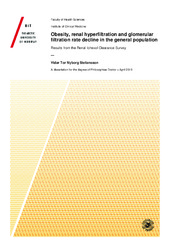| dc.contributor.advisor | Eriksen, Bjørn Odvar | |
| dc.contributor.author | Stefansson, Vidar Tor Nyborg | |
| dc.date.accessioned | 2019-06-27T08:38:54Z | |
| dc.date.available | 2019-06-27T08:38:54Z | |
| dc.date.issued | 2019-06-11 | |
| dc.description.abstract | Obesity is a well-known risk factor for several severe diseases, including diabetes and cardiovascular disease. The metabolic syndrome is a concept related to obesity which includes additional risk factors for disease: increased waist circumference, high blood pressure, elevated fasting glucose, elevated triglycerides and lowered high-density lipoprotein cholesterol levels.
Both obesity and the metabolic syndrome are known risk factors for chronic kidney disease and end-stage renal disease, but their effect on kidney function before reaching those disease states is less clear. The results from previous studies on these subjects are divergent and inconclusive.
The concept of hyperfiltration, a state of elevated GFR (glomerular filtration rate, a measure of kidney function), may contribute to the inconsistency of research results on the subject. Hyperfiltration is present in diabetes, obesity and hypertension, and is a state of distress which may cause kidney damage in the long term. In the short and medium term, however, it may present as higher or increasing GFR. It may also cause albuminuria, which is an early marker of endothelial damage.
In this thesis, the association between obesity, the metabolic syndrome, changes in GFR and hyperfiltration were explored in the population-based Renal Iohexol Clearance Survey. GFR was measured with an accurate method (iohexol clearance) in 1627 persons in 2007-09 and repeated in 1324 of the same persons in 2013-15. The relationship between changes in GFR and changes in albuminuria was also explored, to further explore the concept of hyperfiltration as an increase in GFR over time.
We found that obesity was associated with hyperfiltration, but not with accelerated GFR decline. Increased albuminuria was associated with increased GFR. The metabolic syndrome was associated with accelerated GFR decline. The results point to hyperfiltration as an important factor in the relationship between obesity and GFR, and that hyperfiltration is associated with albuminuria. | en_US |
| dc.description.doctoraltype | ph.d. | en_US |
| dc.description.popularabstract | Obesity is an important risk factor for several diseases, including kidney disease. The metabolic syndrome is a concept that includes obesity, elevated blood pressure and alterations in the levels of sugar and fat in the blood stream. Both obesity and the metabolic syndrome may cause a state of harmful overload on the kidneys called hyperfiltration. We measured kidney function with accurate methods in a large, middle-aged population in Tromsø to shed more light on hyperfiltration and its relation to obesity and the metabolic syndrome. We found that obesity is associated with hyperfiltration, and that the metabolic syndrome was associated with more rapid kidney function decline. We also found that hyperfiltration was associated with albuminuria, which is an early marker of kidney damage. These findings indicate that the relationship between obesity and kidney damage is complex, and that damage to the kidneys may occur while kidney function appears to be high. | en_US |
| dc.description.sponsorship | UiT The Arctic University of Norway | en_US |
| dc.identifier.uri | https://hdl.handle.net/10037/15611 | |
| dc.language.iso | eng | en_US |
| dc.publisher | UiT The Arctic University of Norway | en_US |
| dc.publisher | UiT Norges arktiske universitet | en_US |
| dc.relation.haspart | <p>Paper I: Stefansson, V.T.N., Schei, J., Jenssen, T.G., Melsom, T. & Eriksen, B.O. (2016). Central obesity associates with renal hyperfiltration in the non-diabetic general population: a cross-sectional study. <i>BMC Nephrology, 17</i>, 172. Also available in Munin at <a href=https://hdl.handle.net/10037/10163>https://hdl.handle.net/10037/10163</a>.
<p>Paper II: Stefansson V.T.N., Schei, J., Solbu, M.D., Jenssen, T.G., Melsom, T. & Eriksen, B.O. (2016). Metabolic syndrome but not obesity measures are risk factors for accelerated age-related glomerular filtration rate decline in the general population. <i>Kidney International, 93</i>(5), 1183-1190. Also available at <a href=https://doi.org/10.1016/j.kint.2017.11.012> https://doi.org/10.1016/j.kint.2017.11.012</a>.
<p>Paper III: Melsom, T., Stefansson V., Schei, J., Solbu, M., Jenssen, T.G., Wilsgaard, T. & Eriksen, B.O. (2016). Association of Increasing GFR with Change in Albuminuria in the General Population. <i>Clinical Journal of the American Society of Nephrology, 11</i>(12), 2186-2194. Also available at <a href=https://doi.org/10.2215/CJN.04940516> https://doi.org/10.2215/CJN.04940516</a>. | en_US |
| dc.rights.accessRights | openAccess | en_US |
| dc.rights.holder | Copyright 2019 The Author(s) | |
| dc.rights.uri | https://creativecommons.org/licenses/by-nc-sa/3.0 | en_US |
| dc.rights | Attribution-NonCommercial-ShareAlike 3.0 Unported (CC BY-NC-SA 3.0) | en_US |
| dc.subject | VDP::Medical disciplines: 700::Clinical medical disciplines: 750::Nephrology, urology: 772 | en_US |
| dc.subject | VDP::Medisinske Fag: 700::Klinisk medisinske fag: 750::Nefrologi, urologi: 772 | en_US |
| dc.subject | Obesity | en_US |
| dc.subject | Ageing | en_US |
| dc.subject | Glomerular filtration rate | en_US |
| dc.subject | Hyperfiltration | en_US |
| dc.subject | Metabolic syndrome | en_US |
| dc.subject | Albuminuria | en_US |
| dc.subject | Chronic kidney disease | en_US |
| dc.subject | Epidemiology | en_US |
| dc.subject | The Tromsø Study | |
| dc.subject | Tromsøundersøkelsen | |
| dc.title | Obesity, renal hyperfiltration and glomerular filtration rate decline in the general population | en_US |
| dc.type | Doctoral thesis | en_US |
| dc.type | Doktorgradsavhandling | en_US |


 English
English norsk
norsk
